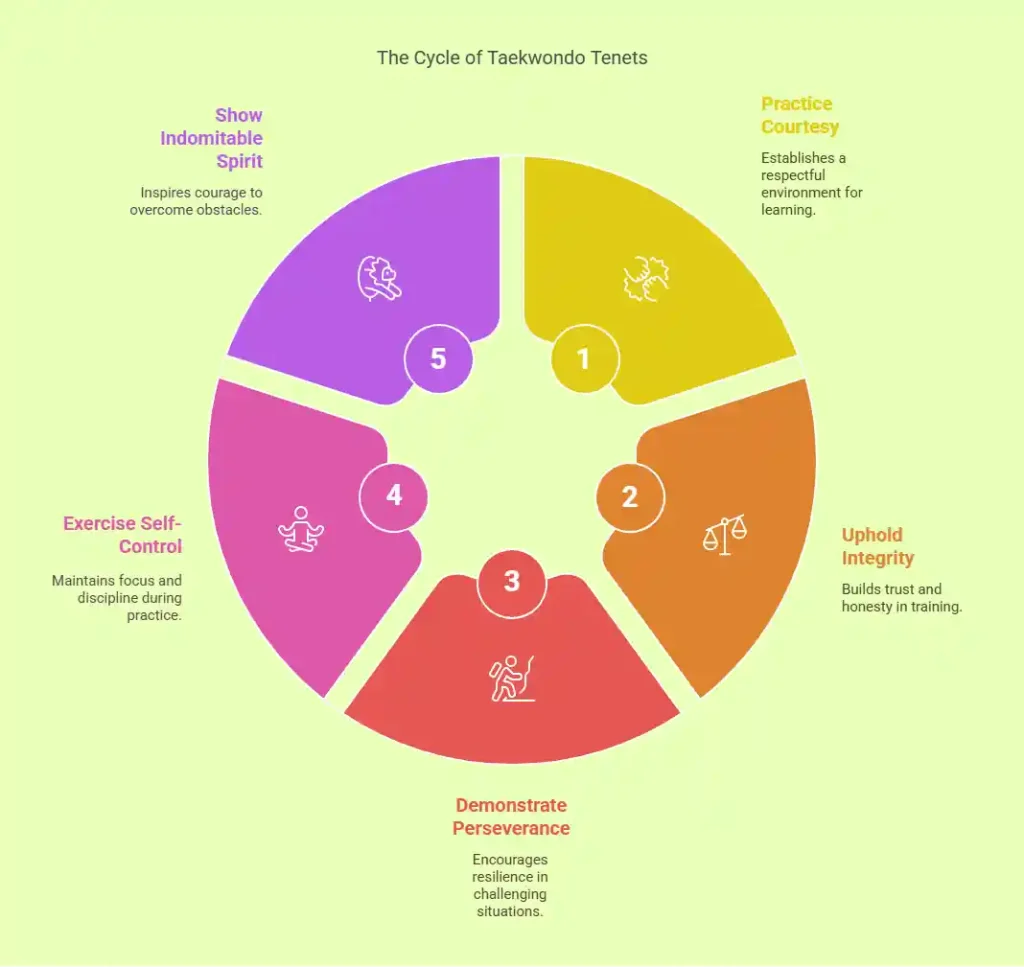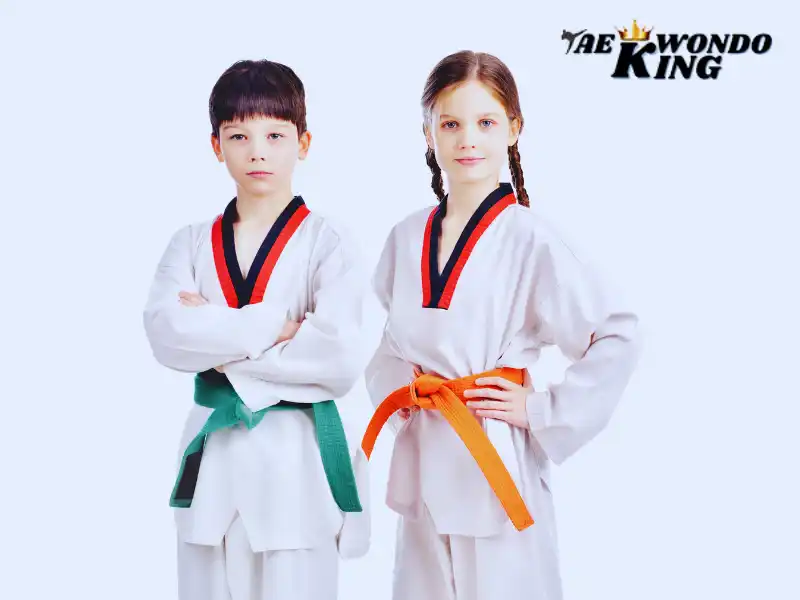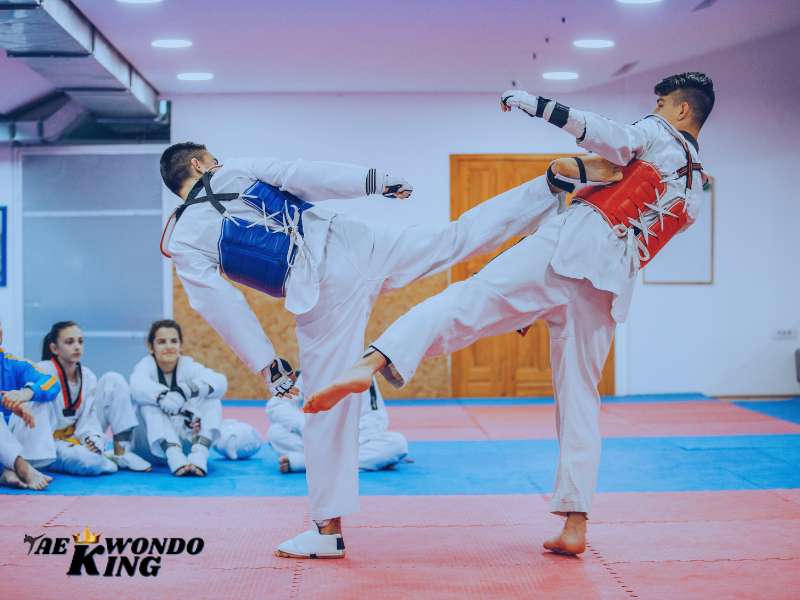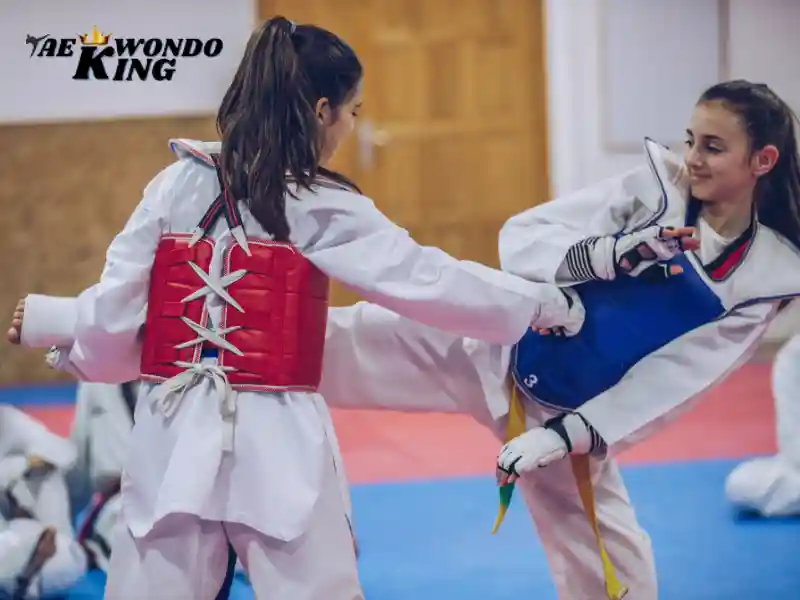
Taekwondo is more than just kicks and punches. It teaches us important lessons for life. The TKD tenets guide us on and off the mat. These principles help shape who we are and how we act. In this article, I will explain the five main TKD tenets and why they matter.
What Are the TKD Tenets?
The TKD tenets are five key values that all Taekwondo students should follow. These values help build character. The tenets are: Courtesy, Integrity, Perseverance, Self-Control, and Indomitable Spirit. They make us better martial artists and better people.
When I first started Taekwondo, I didn’t fully understand how these principles would change me. Over time, I saw how they helped me grow not just as a martial artist but as a person.

The Five Tenets of Taekwondo
The five tenets of Taekwondo serve as the backbone of this martial art. They represent the values that all practitioners are encouraged to uphold:
- Courtesy (Ye Ui) – Treating others with respect and kindness.
- Integrity (Yom Chi) – Upholding strong moral principles and being honest.
- Perseverance (In Nae) – Never giving up, even in the face of adversity.
- Self-Control (Guk Gi) – Exercising control over one’s emotions and actions.
- Indomitable Spirit (Baekjul Boolgool) – Demonstrating courage and strength of will, no matter the obstacles.
Each of these TKD tenets helps us be better inside and outside the dojang. I’ve seen how these values work together in my own training. Self-control, for example, helped me stay focused during sparring when I was nervous.

Courtesy (Ye Ui)
Courtesy, or Ye Ui, is the first and most important tenet. It’s all about respect, respect for your instructors, fellow students, and even yourself. In Taekwondo, every action counts, and courtesy sets the tone for everything. I remember the first time I bowed before class. It felt like a small act, but it meant so much. It wasn’t just about showing respect; it was a reminder that we are all part of something bigger, a community that lifts each other up.
Integrity (Yom Chi)
Integrity, or Yom Chi, is about being honest with yourself and others. It’s knowing what’s right and doing it, even when no one’s watching. I’ve had moments in training where I could’ve taken a shortcut, but I stuck to the right path. One time, after missing a perfect technique, I could’ve ignored it, but I chose to keep working on it, knowing that true progress comes from honesty. Integrity builds trust, and it’s one of the most valuable lessons I’ve learned in Taekwondo.
Perseverance (In Nae)
Perseverance, this is where the rubber meets the road. In Nae is all about pushing through when you want to quit. In the beginning, I struggled with certain moves, and it felt impossible to get them right. But every time I wanted to give up, perseverance reminded me to keep going. It’s not about being perfect, but about being consistent. The more I practiced, the better I became. And the lesson that perseverance teaches you goes far beyond Taekwondo; it helps you tackle life’s challenges with grit.
Self-Control (Guk Gi)
Self-control, or Guk Gi, is more than just controlling your actions; it’s about mastering your emotions. Taekwondo is intense, and at times, it’s easy to let frustration or anger take over. I’ve had moments when I was in a sparring match, feeling my temper flare. But self-control helped me step back, breathe, and focus on the technique, not the emotion. It’s a principle that’s served me in every area of life. You can’t always control what happens, but you can control how you respond.
Indomitable Spirit (Baekjul Boolgool)
Finally, Indomitable Spirit, or Baekjul Boolgool, is about never giving up, no matter the odds. It’s the will to keep fighting when you’re tired, when it feels like you’ve given your all, and when everyone else doubts you. I’ve been there, exhausted after a long training session, thinking I couldn’t go any further. But then, something clicks. That spirit within you rises up, and you push forward. It’s what makes you unstoppable. This tenet has been a game changer for me, both in and out of the dojang.
By living these five tenets of Taekwondo, we become more than just skilled martial artists. We become better people. These values are what make Taekwondo such a powerful journey, because it teaches us not just how to fight, but how to live.
Indomitable Spirit in Taekwondo: The Key to Overcoming Adversity
Indomitable spirit Taekwondo means never giving up, no matter what happens. It’s about standing strong and believing in yourself. I’ve learned that this tenet is the most powerful one. When I was about to quit, I reminded myself of this principle. It kept me going.
The indomitable spirit teaches you to fight for what you believe in, even when things seem impossible. It is one of the most important TKD tenets.
Why the Tenets of Taekwondo Matter Beyond the Dojang
The tenets of Taekwondo don’t just apply to martial arts. They help us in life. When we practice integrity and courtesy, we build better relationships. These values also help us in work and in school.
For me, perseverance has been key. Even when tasks at work or home are hard, I remind myself to keep going. The TKD tenets help me stay positive and focused, no matter what life throws my way.
The Importance of Perseverance and Self-Control in Taekwondo Training
Perseverance and self-control are two of the most important TKD tenets. They help us stay focused and keep trying, even when we fail. These principles have been important in my own training.
When I was learning a difficult move, perseverance helped me keep practicing until I got it right. Self-control kept me calm when I felt frustrated. These TKD tenets have shaped how I approach challenges in life.

Expanding the TKD Tenets: The Sixth Tenet of Taekwondo
In addition to the five main TKD tenets, some schools also teach a sixth one: humility. Humility means being humble. It means not bragging about your skills but letting your actions speak for themselves.
This sixth tenet has helped me stay grounded in my Taekwondo practice. It reminds me to respect others and keep learning. The addition of humility rounds out the values of Taekwondo, helping us be the best versions of ourselves.
Living by Taekwondo Values: Applying the Tenets in Daily Life
The TKD tenets are meant to be lived every day. We should practice these values inside and outside the dojang. They help us be better people. I’ve found that when I use these values in my life, I am more respectful, honest, and focused.
For example, practicing self-control has helped me stay calm in stressful situations. And courtesy has made me more respectful to others. These TKD tenets guide me in everything I do.
Final Thoughts: The Enduring Power of Taekwondo Tenets
The TKD tenets are the foundation of Taekwondo. They help us be better martial artists and better people. The Taekwondo tenets teach us to be strong, respectful, and honest. When we follow these values, we become stronger not just in Taekwondo, but in life.
In my own experience, these TKD tenets have shaped me into the person I am today. They guide me through difficult times and help me stay focused on my goals. I encourage you to apply these principles in your own life. They will help you grow as a martial artist and as a person.

FAQs
The five tenets of Taekwondo are Courtesy, Integrity, Perseverance, Self-Control, and Indomitable Spirit. These values guide students in both their martial arts practice and personal life.
The five principles of Taekwondo are Courtesy, Integrity, Perseverance, Self-Control, and Indomitable Spirit. The five principles of Taekwondo serve as the backbone of the Taekwondo martial art.
Courtesy (Ye Ui) helps build a respectful and supportive training environment. It teaches students to treat others with kindness and fosters a sense of community within the dojang.
Perseverance (In Nae) encourages students to push through challenges and not give up. It builds mental strength and helps students reach their goals, even when things get tough.
Self-Control (Guk Gi) allows students to remain calm and focused, even in high-pressure situations. It’s key in sparring and helps maintain discipline during training.
Indomitable Spirit (Baekjul Boolgool) is the will to never give up. It’s about facing challenges with courage, maintaining determination, and giving your best effort in everything you do.

Founder, Owner, and CEO of TaekwondoKing.
He is one of the top 100 martial artists in the World and among the top 20 referees in Bangladesh.
Ehatasamul Alom is an esteemed Kukkiwon Certified Taekwondo 3rd Dan Black Belt with over 15 years of experience in this dynamic martial art. Born in Rajshahi, Bangladesh, Ehatasamul’s journey with Taekwondo began at the tender age of seven. His passion led him to compete at national and international levels, where he has bagged numerous awards and honors. He is also a member of the Taekwondo National Referee Panel.
With a Bachelor’s degree in Sports Science from the prestigious Rajshahi University, Ehatasamul has a deep understanding of the technical and scientific aspects of martial arts and some other martial arts.
In 2022, Ehatasamul created the “TaekwondoKing.com” to share his knowledge, Free Resources, Values, and Real experiences. His articles focus on Taekwondo training techniques, competition strategies, Sport Products Reviews, and the art’s rich history and philosophy. He also writes about the importance of mental fortitude and discipline, key aspects of his teaching philosophy. He has already launched many sports, Taekwondo, and health-related Free online tools. His goal is to inspire both beginners and seasoned practitioners worldwide through insightful and engaging content.
If you need any help, contact Ehatasamul Alom at any time.




